| Information
Service of
the Serbian Orthodox Church
May 11, 2004

CENTRAL CHURCH AND BELGRADE CELEBRATION
OF THE BICENTENNIAL OF THE FIRST SERBIAN UPRISING
May 8-11, 2004
Saturday, May 8
Doxology and Evening Service in St. Sava Cathedral
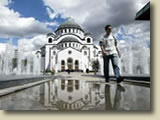 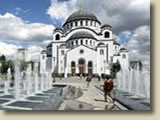
The celebration of a milestone anniversary, the Bicentennial
of the Serbian Uprising and National Rebirth, began on May 8,
2004 with a Doxology in St. Sava Cathedral before a congregation
of several thousand faithful.
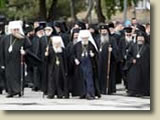 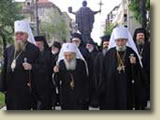
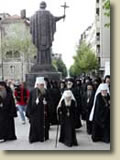 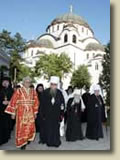
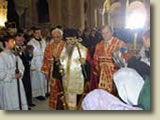
The ringing of all of St. Sava's bells at 5:00 p.m. announced
the arrival of eminent guests. At the main door of the Cathedral,
priests, deacons, lectors and icon-bearers in formal vestments
lined up to greet the Patriarchs of the local churches, their
escort and His Holiness Patriarch Pavle of Serbia.
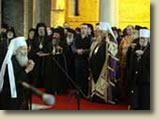 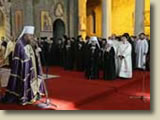
After the
doxology, His Holiness Patriarch Pavle greeted the guests,
the Patriarchs of the local churches; responding on behalf
of all the guests, the eldest archbishop, Metropolitan Sawa of
Warsaw and All-Poland, expressed his warmest thanks for the invitation
of the sisterly Serbian Church so they could celebrate together
and in Christ's love the jubilee anniversary and completion of
work on St. Sava Cathedral, whose celebration begins today in
this church. His Eminence added that "the Serbian people
and clergy have waited for many years for this day. This is a
historic day in the life of the Serbian Church and the Serbian
state. In this very location the holy relics of St. Sava were
burned by those wishing to destroy the people's faith and love
toward their Church but in this they failed. Many generations
have nurtured the dream of building a House of God in the location
where the holy relics were burned.
There is none like God!
The bad times have passed and today we can say with pride:
God is with us!
Today God truly is
with the Serbian people!
God has given
the Serbian people the hope and the strength to achieve this
joy. This is the joy of the Serbs but of all other
Orthodox Christians, too." Metropolitan Sawa then expressed
the hope that God would grant the Serbian people the strength
to begin and complete the next phase, the appointment of the
interior of the church. The Evening Service was served by His
Eminence Metropolitan Amfilohije of Montenegro and the Littoral.
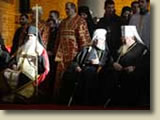 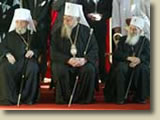
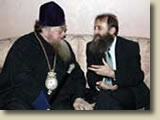
Sunday, May 9
Holy Archierchal Liturgy in Vavedenje Monastery
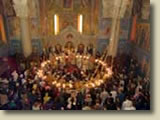 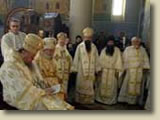
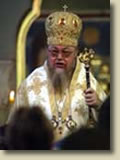
A visit to the Crown Prince in the White Palace
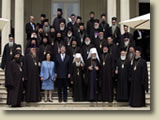 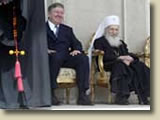
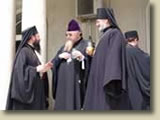
PAN-ORTHODOX FESTAL PROCESSION
On Sunday, May 9, 2004, a festal procession the likes of which
the capital of Belgrade had never seen before passed through
the streets of the city from Stambol Kapija (Republic Square)
to St. Sava Cathedral. Over 100,000 people took part in the festal
procession.
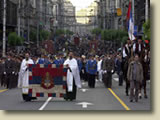 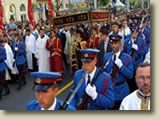
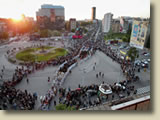 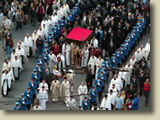
Truly, the picture was unforgettable. At the head of the festal
procession, two priests bore the flag of the Serbian Patriarchate,
followed by cavalrymen in folk costume carrying banners and the
Processional Cross.
They were followed by the icon of the Three-Handed Mother of
God on a special platform, which was continuously censed by two
deacons. The icon was followed by the choir of the Theological
Faculty singing troparia.
The icon and the choir were followed by the archbishops according
to canonic order, first the younger and then the elder, flanked
by the Patriarchs of the local Orthodox Churches in the back.
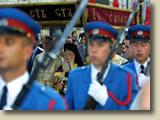 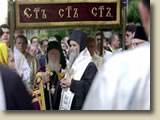
Behind the Patriarchs, alone, walked the Ecumenical Patriarch
in formal vestments with a scepter and cross. Two deacons walked
in front, continuously censing His All Holiness. Walking down
entire length of this part of the procession were Priests in
white vestments and members of the Serbia and Montenegro Armed
Forces Guard in formal uniform.
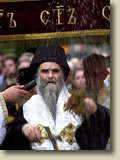 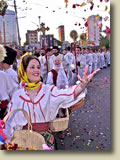 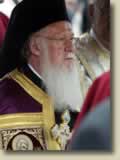
Walking behind the Ecumenical Patriarch were Crown Prince Aleksandar
Karadjordjevic, Princess Katarina Karadjordjevic, Princess Jelisaveta,
Princess Linda (the widow of the late Prince Tomislav) and her
son, Mihailo Karadjordjevic. They were followed by the highest
representatives of the State Union of Serbia and Montenegro,
senior officials of other Christian Churches and members of the
diplomatic corps. Behind the diplomatic corps walked members
of the clergy not wearing vestments and the nuns of the Archbishopric.
They were followed by the members of the Serbian Choir Assembly,
with 24 choirs taking part in the festal procession and singing
spiritual music in turn. The procession passed through lines
of citizens, who greeted the procession in orderly fashion and
then joined it at the rear.
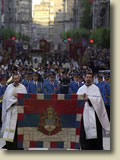 During the course of the processional walk, there were three
stops: one at Terazije Fountain, where the Ecumenical Patriarch
read from the Gospel according to Matthew. The procession stopped
a second time at the Beogradjanka high-rise, where His Eminence
Metropolitan Amfilohije read from the Gospel according to Mark.
The third stop was in the square in front of St. Sava Cathedral,
where his Eminence Metropolitan Jovan read from the Gospel according
to Luke. During the course of the processional walk, there were three
stops: one at Terazije Fountain, where the Ecumenical Patriarch
read from the Gospel according to Matthew. The procession stopped
a second time at the Beogradjanka high-rise, where His Eminence
Metropolitan Amfilohije read from the Gospel according to Mark.
The third stop was in the square in front of St. Sava Cathedral,
where his Eminence Metropolitan Jovan read from the Gospel according
to Luke.
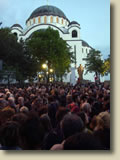 For the first time since the Second World War, Belgraders and
numerous guests from other cities saw young members of the Serbia
and Montenegro Armed Forces Guard and cadets of the Police Academy
removing their caps during the reading of the Gospels. The atmosphere
in the street was momentous. Belgrade showed its true face to
the world: Christian, civil and European. For the first time since the Second World War, Belgraders and
numerous guests from other cities saw young members of the Serbia
and Montenegro Armed Forces Guard and cadets of the Police Academy
removing their caps during the reading of the Gospels. The atmosphere
in the street was momentous. Belgrade showed its true face to
the world: Christian, civil and European.
After the festal procession a concert of spiritual music was
held in St. Sava Cathedral with 16 choirs singing spiritual music.
After the concert people lingered for a long time in the beautiful
square in front of the church which harmoniously complements
the appearance of the church, and it is reasonable to expect
that the church and the square will become the true spiritual
heart of Belgrade. The celebration moved from the church into
the street as many choirs continued to sing in the city center
after the end of the church concert.
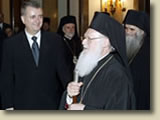
Reception by the Municipal Assembly hosted by
Mr. Bogdanovic, chairman of the executive council
Monday, May 10
Holy Archierchal Liturgy
On Monday, May 11, 2004, the memorial day of the Burning of
the Relics of St. Sava, to the accompaniment of the ringing of
all bells, a formal religious procession of priests and deacons,
lead by the icon-bearers and lectors arrived before the closed
doors of St. Sava Cathedral, signaling the beginning of the formal
OPENING OF THE CHURCH (doors). First to enter the Holy Shrine
were the Ecumenical Patriarch and Patriarch Pavle, followed by
the other Patriarchs and archbishops, serving clergy and finally,
the faithful. There were some 8,000 people present in the church
during Holy Archierchal Liturgy. After the re-consecration of
the Holy Shrine, Holy Archierchal Liturgy was served by the following:
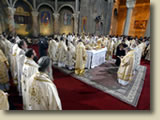 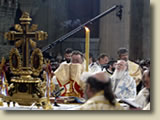
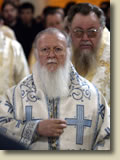 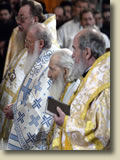 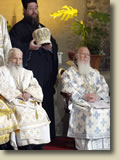
Archpriests:
Ecumenical Patriarch Bartholomew
Patriarch Pavle of Serbia
Metropolitan Sawa of Warsaw
Metropolitan Nicholas of Preshov
Metropolitan John of Pergamon (Ecumenical Patriarchate)
Metropolitan Iakovos of Laodicea and Prince Islands (Ecumenical
Patriarchate)
Metropolitan Dionysios of Leontopolis (Alexandria Patriarchate)
Metropolitan Damaskinos of Jaffa (Jerusalem Patriarchate)
Archbishop Paul of Ryazan and Kasimov (Russian Patriarchate)
Metropolitan Teophan of Oltenia (Romanian Patriarchate)
Bishop Vicentius (Romanian Patriarchate)
Metropolitan Dometiyan of Vidin (Bulgarian Patriarchate)
Metropolitan Grigory of Veliko Turnovo (Bulgarian Patriarchate)
Archbishop Nicholas (Georgian Patriarchate)
Metropolitan Chrysostomos of Paphos (Archbishopric of Cyprus)
Metropolitan Cyril of Kythira (Archbishopric of Greece)
Metropolitan John of Korca (Archbishopric of Albania)
Archbishop Christopher of Prague (Czech Metropolitanate)
And
all Archbishops of the Serbian Orthodox Church, presvyters
of all sister Orthodox Churches and priests, deacons, hypodeacons
and lectors of the Serbian Orthodox Church.
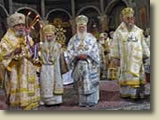
During the course of the Holy Archierchal Liturgy His Grace
Bishop Grigorije of Zahumlje and Herzegovina read the ST. SAVA
EPISTLE. The cutting of the Slava cake took place after Liturgy.
His Holiness Patriarch Pavle greeted the guests. The Ecumenical
Patriarch was the first to respond in greeting, followed by the
other distinguished guests. At this time gifts were exchanged.
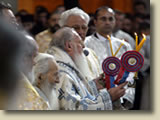 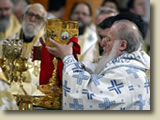
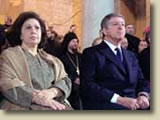 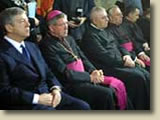
Upon the conclusion of Holy Liturgy a Requiem service was held
before the monument to Vozd Karadjordje (the Leader Karageorge);
then, the festal procession walked to the location where His
All Holiness Ecumenical Patriarch Bartholomew and Serbian Patriarch
Pavle placed the cornerstone of the new building of the Serbian
Patriarchate.
Holy Archierchal Liturgy in St. Sava Cathedral was attended
by the highest representatives of the Republic of Serbia, the
City of Belgrade, the State Union of Serbia and Montenegro, as
well as the Army and Police.
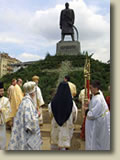 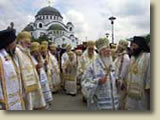
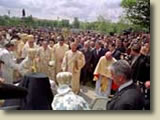 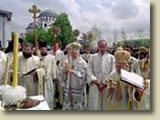
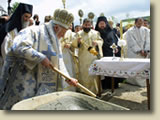
Placement of the cornerstone for new building of
Serbian Patriarchate
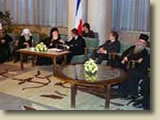
Reception by State Union of Serbia and Montenegro President
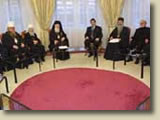 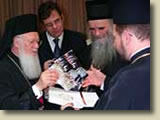
Reception by Serbian Premier

Tuesday, May 11 THEOLOGICAL FACULTY OF THE SERBIAN ORTHODOX CHURCH AWARDS HONORARY
DOCTORATE TO HIS ALL HOLINESS ECUMENICAL PATRIARCH BARTHOLOMEW
On Tuesday, May 11, 2004, the Theological Faculty of the Serbian
Orthodox Church awarded His All Holiness Ecumenical Patriarch
Bartholomew with an honorary doctorate (honoris causa).
At a meeting held on April 1, 2004, members of the Instructional-Research
Board of the Theological Faculty of the Serbian Orthodox decided
to grant His All Holiness Ecumenical Patriarch Bartholomew a
honorary doctorate for his efforts in spreading good news and
advocacy in the Orthodox faith, as well as the efforts of His
All Holiness toward peace in the whole world.
A commission comprised of His Eminence Metropolitan Amfilohije
of Montenegro and the Littoral, full professor; His Grace Bishop
Irinej of Backa, full professor; His Grace Bishop Ignjatije of
Branicevo, full professor; and assistant professor Father Zoran
Krstic signed the honorary degree of His All Holiness.
After the
welcome speech and the reading of the paper, the dean of the
Theological Faculty, Father Dr. Vladan Perisic, invited
His All Holiness to present a lecture on this occasion on the
topic "Chance, necessity and will".
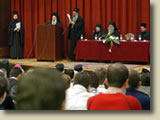 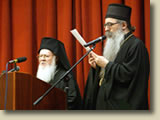
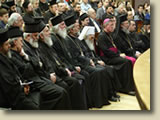 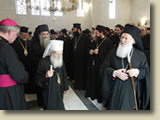
Awarding of honorary doctorate to
His All Holiness Patriarch Bartholomew of Constantinople
In the introductory part of his presentation His Holiness explained
the concept of chance and the untenability of the theory of the
chance origin of the world. He emphasized that not even physicists
know why particles and molecules behave as they do, despite precisely
established physics theories and natural laws.
Further in the presentation, he explained the concept of necessity,
which has been represented in many philosophical disciplines.
Necessity suspends freedom and limits human activity and leads
man toward languor and passivity, and that is the very direction
in which the Protestant teaching on predetermination, the Buddhist
teaching on karma and the teaching on fatum, or fate, is leading.
Invocation of chance and necessity only reflects human powerlessness
and our doubt in our own will.
Christians believe that the world is ruled by man-loving Will,
which allows freedom to everyone whom it also created. The manner
in which it acts in the world is not in the domain of our comprehension.
The Holy Fathers presented and elaborated the principles of the
action of Will to us but we still have not understood the true
import of their words.
The Will of the Almighty does not utilize human will. Our salvation
does not depend on our own will but on our faith and freedom
from dead laws, which transform man into a slave. It is necessary
to sacrifice material existence for spiritual hypostasy (Mat
16:25). The holy martyrs are examples of this very thing.
Our spirit can be harmonized with the Will of the Triune God
and it can grow distance from its own will, but it cannot direct
the Will. The Will of the Triune God is above chance and necessity,
above the law and above other wills.
Faith, hope and love toward the Holy Trinity includes us in
the plan and guiding principles of Our Lord Jesus Christ, and
that is the only way we can feel we are connected to Him. If
we do not accept this, we wander in the fog.
His All Holiness Ecumenical Patriarch Bartholomew was born February
29,1940, in on the Aegean island of Imvros. His parents christened
him Demetrios.
Following his studies at Imvros and Constantinople, he enrolled
at the Theological School of Halki, graduating in 1961. He was
immediately ordained to the Holy Diaconate on August 13, 1961
at the Metropolitan Cathedral of Imvros by Metropolitan Meliton.
From 1963-68,
he pursued postgraduate studies at the Pontifical Oriental
Institute of the Gregorian University in Rome. He received
his doctorate in Canon Law having submitted his dissertation: "Concerning
the Codification of the Sacred Canons and Canonical Regulations
in the Orthodox Church".
He is fluent in seven languages: Greek, English, Turkish, Italian,
Latin, French and German. He has published many articles in all
languages of the world.
When he returned to Constantinople in 1968, he was appointed
assistant dean of the Sacred Theological School of Halki and,
on October 19,1969, was ordained to the Holy Priesthood. Six
months later, His All Holiness Ecumenical Patriarch Athenagoras
elevated Father Bartholomew to the office of Archimandrite in
the Patriarchal Chapel of St. Andrew.
When Dimitrios was elected Ecumenical Patriarch in 1972, he
established his Patriarchal Office and named the young Archimandrite
Bartholomew as its director.
On Christmas Day, 1973, Father Bartholomew was consecrated a
bishop and named Metropolitan of Philadelphia (of Asia Minor).
He remained as head of the Personal Patriarchal Office until
his enthronement as the Metropolitan of Chalcedon on January
14,1990.
On October 22, 1991, His All Holiness was unanimously elected
by the grace of God, Archbishop of Constantinople, New Rome and
Ecumenical Patriarch, following the death of Patriarch Dimitrios
on October 2nd, 1991.
His All Holiness Ecumenical Patriarch Bartholomew is the 270th
successor to the Apostle Andrew and spiritual leader of 300 million
Orthodox Christians worldwide. Through dialogue and visitations,
he has greatly advanced Orthodox relations with all Christian
religious communities, as well as taking a highly active role
in surmounting major post communist problems in Orthodox national
churches of Eastern Europe.
Known in
Europe as the "Green Patriarch," Ecumenical
Patriarch Bartholomew has taken the lead among all religious
leaders in his concern for the environment.

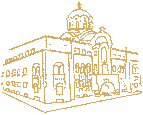
Copyright © 1999-2004 by
The Information Service of
the Serbian Orthodox Church
11000 Belgrade
Kralja Petra I no.5
+381 11 3282 596
e-mail
|

